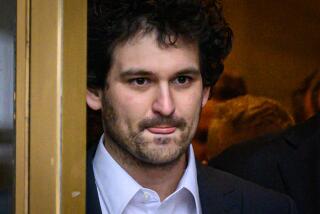Jeffrey Gundlach blames rift on TCW’s broken promises
TCW Group Inc. and its French parent company broke key promises made to TCW’s top money managers, fueling a rebellion at the L.A. asset management firm, a jury was told.
Jeffrey Gundlach, TCW’s star bond fund manager until the firm fired him in 2009, testified in court Tuesday that the company had pledged that employees would always own 30% of the stock in the business.
But French banking titan Societe Generale, which bought control of TCW in 2001, never followed through on that promise, Gundlach said. That left him and other senior portfolio managers angry and demoralized, he said.
On trial for allegedly conspiring against TCW and stealing its trade secrets to form a rival firm, Gundlach spent a second day on the stand under friendly questioning by his own attorneys. They portrayed him as devoted to the company and its clients despite what Gundlach said was mistreatment by TCW and Societe Generale.
Even as he built his bond fund business into by far TCW’s single largest division, dwarfing the firm’s stock fund unit, “they kept telling me that the profitability of the fixed-income department was too low” compared with what the stock funds earned, Gundlach said.
The 51-year-old manager, whom TCW has painted as arrogant and disloyal, at one point during his testimony launched into a mocking French accent, recounting some comments by Societe Generale’s chief executive in a teleconference.
Gundlach, considered one of the country’s top investors in mortgage-backed bonds, spent 24 years at TCW. He was ousted in December 2009 after the firm said he had threatened to abruptly leave the company.
Ten days later he formed DoubleLine Capital, and most of his bond staff from TCW quickly jumped ship to join him.
TCW, which manages about $120 billion in assets, sued Gundlach and three lieutenants in January 2010 alleging that they breached their fiduciary duties to the company, conspired to abandon the firm and stole massive amounts of data on their way out.
Gundlach countersued, accusing TCW and Societe Generale of firing him to cheat him out of a huge chunk of promised income. He said he only made contingency plans to leave the firm, including scouting for office space in the fall of 2009, because he believed there was a plot to terminate him.
Each side is seeking hundreds of millions of dollars in damages from the other in the civil jury trial in L.A. County Superior Court.
Gundlach on Tuesday reiterated previous testimony that DoubleLine, which now manages $14 billion in assets, never used any of TCW’s proprietary information. But much of his time on the stand was used to describe his frustration with the company in his last few years there, even as he earned tens of millions of dollars in compensation.
Despite his title of chief investment officer of the entire firm, Gundlach said he had no authority over the managers who oversaw TCW’s stock funds.
Gundlach said he sought to persuade other managers at TCW to bail out of major bank stocks before the financial system meltdown in 2008, but was rebuffed.
“I thought they were going to zero,” he said of stocks of firms such as Fannie Mae and Citigroup. But his stock-fund peers at TCW “wouldn’t listen to me,” he said.
Gundlach recounted how Robert Beyer, who was CEO of TCW in the fall of 2008, told him that Societe Generale CEO Frederic Oudea was ready to announce a new plan to grant stock ownership to TCW employees.
But when Oudea appeared before TCW officers via teleconference from New York, he ambushed Beyer by never mentioning a stock plan, Gundlach testified.
Gundlach, using a French accent, testified that Oudea said, “The asset management business — I don’t know I even want to be in it. I will be deciding.” Then he left the meeting, Gundlach said.
When Beyer quit in June 2009, Societe Generale brought back former TCW executive Marc Stern as CEO. Gundlach said that infuriated not only him but other top TCW managers, including Mark Attanasio and Jean-Marc Chapus, who together had headed the company’s junk bond unit.
The return of Stern, 66, broke TCW’s promise to put management of the firm in the hands of a younger generation of executives, Gundlach said.
He testified that Attanasio led a push to force Societe Generale to name a management committee for TCW instead of putting Stern in charge again. But Societe Generale stuck with Stern.
By September 2009, Gundlach said, he sought a meeting with Jacques Ripoll, who oversaw the fund management business for Societe Generale, to clarify his future.
That meeting “made me think maybe I was being fired,” Gundlach said. “It was like talking to a piece of cardboard. He really wasn’t interested in what I had to say.”
Gundlach will continue his testimony Wednesday.
More to Read
Inside the business of entertainment
The Wide Shot brings you news, analysis and insights on everything from streaming wars to production — and what it all means for the future.
You may occasionally receive promotional content from the Los Angeles Times.










